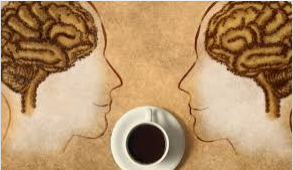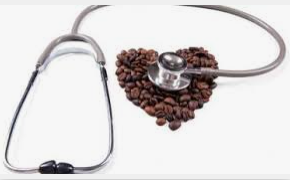1. Improves circulation
Drinking a five-ounce cup of coffee is proven to cause a 30% boost in capillary blood flow according to a Japanese study. This level of increased blood circulation results in better oxygenation of your body’s tissues which has a number of benefits, such as improved performance in physical activities.
https://newsarchive.heart.org/coffee-may-help-perk-up-your-blood-vessels/
2. Is pain-reducing
Research from the University of Illinois determined that 2-3 cups of coffee can decrease participants’ perceived level of pain, in this case following a workout. These findings were repeated in a University of Georgia study where participants reported 48% decrease in muscle soreness, vs. 30% and 25% with naproxen and aspirin, respectively. https://www.jpain.org/article/S1526-5900(06)01023-6/abstract

3. Improves endurance
Not only can coffee decrease your perceived level of pain during physical exertion, it can also decrease your perceived level of exertion. By reducing the amount of energy you feel, you’re expending (by more than 5%), and your exercise actually feels easier. As a result, drinking coffee before working out can improve exercise performance by more than 11%, since you feel like you’re exerting less energy.
https://www.ncbi.nlm.nih.gov/pubmed/15773860
4. Helps preserve muscle tissue
When you drink coffee, your brain releases a substance called Brain-Derived Neurotrophic Factor (BDNF), which supports the powerhouse of your muscles. Without this essential factor, muscles are more likely to experience atrophy. Essentially, the caffeine in coffee helps stave off age-related strength loss which can also reduce your risk of injuries. https://www.ncbi.nlm.nih.gov/pmc/articles/PMC5697621/

5. Helps cognitive function
Caffeine in coffee induces feelings of alertness and increased energy as a result of its interactions with adenosine receptors in the brain. This causes an improvement in various areas of brain function such as reaction times, vigilance and general cognitive function. It’s the reason many people turn to their morning cup of coffee. Coffee can give you that extra boost you need when you’ve had insufficient sleep. This is due to the caffeine which acts as a stimulant that helps you feel more alert and focused. It gives you a boost in energy and helps you keep going when you’re low on stamina.
https://www.ncbi.nlm.nih.gov/pubmed/18625110
https://www.ncbi.nlm.nih.gov/pubmed/8232842
https://link.springer.com/article/10.1007/s002130000383
6. Raises energy levels
Coffee contains stimulants. Many biologically active substances found in coffee beans find their way into the final drink. Several of them can affect your metabolism: Caffeine: The main stimulant in coffee, caffeine, is very potent and works by blocking an inhibitory neurotransmitter called adenosine. By blocking adenosine, caffeine increases the firing of neurons and release of neurotransmitters like dopamine and norepinephrine. This, in turn, makes you feel more energized and awake. In this way, coffee helps you stay active when you would otherwise feel tired and may improve exercise performance by 11–12%, on average. Caffeine stimulates the nervous system, sending direct signals to the fat cells to be used for energy rather than remain in storage. It does this by increasing blood levels of the hormone epinephrine. Epinephrine, also known as adrenaline, travels through your blood to the fat tissues, signaling them to break down fats and release them into your blood.
https://link.springer.com/article/10.1007%2Fs10068-010-0151-6
https://www.ncbi.nlm.nih.gov/pubmed/11815511
https://www.ncbi.nlm.nih.gov/pubmed/8201901
https://www.ncbi.nlm.nih.gov/pmc/articles/PMC4115368/
https://www.ncbi.nlm.nih.gov/pubmed/20164566
https://onlinelibrary.wiley.com/doi/abs/10.1111/j.1600-0838.2005.00445.x
https://www.ncbi.nlm.nih.gov/pubmed/15657469/
Theobromine: The main stimulant in cocoa; also found in smaller amounts in coffee. https://www.ncbi.nlm.nih.gov/pubmed/25750625
Theophylline: Another stimulant found in both cocoa and coffee; has been used to treat asthma. https://www.ncbi.nlm.nih.gov/pubmed/23672674
Chlorogenic acid: One of the active compounds in coffee; may help slow the absorption of carbs. In one Spanish study, athletes who drank the equivalent of 12 ounces of coffee before working out burned roughly 15% more calories than normal, for as much as three hours after exercising. Even if you don’t work out, 23 drinking one to two cups per day of coffee has been proven to boost your metabolism by 10 to 20%.
https://www.ncbi.nlm.nih.gov/pubmed/1932494
https://www.ncbi.nlm.nih.gov/pubmed/24901809
7. Helps burn fat
Releasing fatty acids into your blood does not help you lose fat unless you are burning more calories than you consume through your diet. This condition is known as a negative energy balance. You can reach a negative energy balance by either eating less or exercising more. Another complementary strategy is to take fat-burning supplements such as caffeine. Caffeine is found in almost every commercial fat-burning supplement — and for good reason. It’s one of the few natural substances proven to aid fat burning. Several studies show that caffeine can boost your metabolic rate by 3–11%.
https://www.ncbi.nlm.nih.gov/pubmed/2912010
https://www.ncbi.nlm.nih.gov/pubmed/7486839

8. Improves memory
Another important brain function supported by coffee consumption is enhanced memory. Drinking two eight-ounce cups of coffee per day has been proven to improve long-term memory.
https://www.ncbi.nlm.nih.gov/pmc/articles/PMC5909971/
https://www.ncbi.nlm.nih.gov/pubmed/18625110
http://www.townsendletter.com/Jan2005/nutinflu0105.htm

9. Lowers risk of depression
In a Harvard study published in 2011 coffee has also been linked to a lower rate of depression, especially in women. Those who consume as many as four eight-ounce cups per day were found to lower their depression risk by as much as 20%. This lowered risk is due to the fact that coffee also has an impact on the production of brain chemicals such as serotonin and dopamine. Another study in 208,424 individuals found that those who drank 4 or more cups per day were 53% less likely to die by suicide. Make you feel happier. Being happy is healthy, right? And for those who love coffee, there’s nothing better than that familiar warmth and taste that gets you going each morning, or any time of the day.
https://www.ncbi.nlm.nih.gov/pmc/articles/PMC6163886/
https://www.ncbi.nlm.nih.gov/pubmed/26339067
https://www.psychologytoday.com/intl/blog/the-superhuman-mind/201709/how-does-coffee-help-alleviate-depression https://jamanetwork.com/journals/jamainternalmedicine/fullarticle/1105943
https://www.ncbi.nlm.nih.gov/pubmed/21949167
https://www.ncbi.nlm.nih.gov/pubmed/8604958

10. Reduces risk for some cancers
Coffee has been linked to a lowered risk for both liver and colorectal cancer, the world’s third and fourth most common cancers. Coffee drinkers appear to be at a 40% lower risk for liver cancer and 15% lower risk of colorectal cancer if they drink four to five cups per day. Links have also been found between coffee drinkers and a lower risk of basal cell carcinoma, a type of skin cancer.
https://bmjopen.bmj.com/content/7/5/e013739
https://www.ncbi.nlm.nih.gov/pmc/articles/PMC4874555/
https://www.ncbi.nlm.nih.gov/pmc/articles/PMC4059399/
https://www.sciencedirect.com/science/article/pii/S0016508507005689
https://onlinelibrary.wiley.com/doi/full/10.1002/ijc.20989
https://www.ncbi.nlm.nih.gov/pubmed/22695871
11. Reduces risk for heart disease
Studies over the years have claimed that consuming caffeine can increase blood pressure. While this is true, the effect is quite small and generally only present among those who don’t drink coffee regularly. There is no study found to support the idea that coffee increases the risk of heart disease. However, evidence shows that coffee can reduce the risk of heart diseases in some individuals, particularly in women. Coffee drinkers are also at a 20 percent lower risk of stroke.
https://heart.bmj.com/content/101/9/686
https://www.ncbi.nlm.nih.gov/pubmed/22170367
https://www.ncbi.nlm.nih.gov/pubmed/21880846
https://www.ncbi.nlm.nih.gov/pubmed/14967827
http://europepmc.org/abstract/MED/10556993
https://www.ncbi.nlm.nih.gov/pubmed/16636169
https://www.sciencedirect.com/science/article/pii/S0939475306001694
https://www.sciencedirect.com/science/article/pii/S0167527308008498
https://www.ncbi.nlm.nih.gov/pubmed/23493733
https://www.ncbi.nlm.nih.gov/pubmed/21920945

12. Protects your liver
In addition to preventing cancer of the liver, coffee has also been shown to prevent other common diseases affecting the liver, such as hepatitis and fatty liver disease. Coffee can protect against cirrhosis of the liver, where the organ is majorly damaged by scar tissue, by as much as an 80% lower risk in people who drink four or more cups each day.
https://www.ncbi.nlm.nih.gov/pubmed/28578837
https://www.ncbi.nlm.nih.gov/pubmed/16772246
https://www.ncbi.nlm.nih.gov/pubmed/11897178
https://www.ncbi.nlm.nih.gov/pubmed/11557177
13. Helps combat gout
Gout is a condition caused by an increase in uric acid in the blood. Men who drank four to five cups of coffee a day had a 40 percent lower relative risk of gout compared to men who didn’t drink coffee. Decaf coffee also modestly lowered gout risk.
https://onlinelibrary.wiley.com/doi/full/10.1002/art.22712
http://blog.arthritis.org/gout/coffee-gout/
https://www.ncbi.nlm.nih.gov/pubmed/17530645
https://onlinelibrary.wiley.com/doi/pdf/10.1002/art.22712
14. Helps absorption of numerous nutrients and antioxidants
Many people in Western culture get more antioxidants from coffee than they do from fruits and vegetables combined. Other important ingredients include riboflavin (11% of the RDA), potassium (3%), magnesium and niacin (2% each). These amounts are increased if you drink more than one cup per day. Our bodies are under constant attack by reactive molecules called “free radicals.” These molecules have unpaired electrons that can damage important cell structures like proteins and DNA. This is where antioxidants step in. They donate electrons to the free radicals to disarm them. This is believed to protect against aging and many diseases that are partly caused by oxidative stress, including cancer.

15. Improves overall health
Additionally, antioxidants can have various other biological effects and are considered to be very important for overall health. Interestingly, coffee contains very large amounts of several powerful antioxidants. These include hydrocinnamic acids and polyphenols, to name just a couple.
http://phenol-explorer.eu/contents/food/552
https://www.ncbi.nlm.nih.gov/pubmed/15113710
16. Neutralizes free radicals
Hydrocinnamic acids are very effective at neutralizing free radicals and preventing oxidative stress.
https://www.ncbi.nlm.nih.gov/pubmed/23956973 Additionally, the polyphenols found in coffee may help prevent a number of other diseases, such as heart disease, cancer and type 2 diabetes. https://www.ncbi.nlm.nih.gov/pubmed/22747081 https://www.ncbi.nlm.nih.gov/pubmed/22897371 https://www.ncbi.nlm.nih.gov/pubmed/17551696 https://www.ncbi.nlm.nih.gov/pubmed/25174925 https://www.ncbi.nlm.nih.gov/pubmed/18287367 https://www.ncbi.nlm.nih.gov/pubmed/21490142/ https://www.ncbi.nlm.nih.gov/pubmed/22879444/
According to eleven distinguished researchers from the Nestle’ Institute in Japan, “Coffee Is our biggest dietary source of antioxidants.” Beverages are a larger source of antioxidants in the Western diet than food. According to one government study, 79% of dietary antioxidants comes from beverages, the greatest majority from coffee; while only 21% comes from food. Most people consume about 1–2 grams of antioxidants per day. The majority comes from beverages like coffee and tea.
In one study, researchers looked at the antioxidant content of different foods by serving size. Coffee ranked eleventh on the list, after several different types of berries. https://www.ncbi.nlm.nih.gov/pubmed/21045839
However, very few people eat such large amounts of berries, but drinking several cups of coffee per day is common. For this reason, the total amount of antioxidants provided by coffee far outweighs the amounts in berries, even though berries may contain greater amounts per serving. https://www.ncbi.nlm.nih.gov/pubmed/26101616
In Norwegian and Finnish studies, coffee was shown to be their single biggest antioxidant source, providing 64% of average daily total antioxidant intake. In both of these studies the average coffee intake was 3 cups/day (c. 525 ml. daily). https://www.ncbi.nlm.nih.gov/pubmed/18287367 https://www.ncbi.nlm.nih.gov/pubmed/14988447
Studies from Spain, Japan, Poland and France all confirm that coffee is the biggest source of antioxidants in their national diets as well. https://www.ncbi.nlm.nih.gov/pubmed/21490142/ https://www.ncbi.nlm.nih.gov/pubmed/26101616 https://www.ncbi.nlm.nih.gov/pubmed/14506489 https://www.ncbi.nlm.nih.gov/pubmed/19187022 https://www.ncbi.nlm.nih.gov/pubmed/22968335 https://www.ncbi.nlm.nih.gov/pubmed/25280419
17. Lowers risk of type 2 Diabetes
Type 2 Diabetes is a major health problem, characterized by elevated blood sugar levels caused by insulin resistance or a reduced ability to secrete insulin. This type of diabetes currently affects around 300 million people across the world. Coffee drinkers reduce their risk with every cup they drink. Results from various studies indicate a 23– 50% lower risk for heavy coffee drinkers, and in one study, extreme coffee consumers reducing their risk by up to 67%.
https://www.healthline.com/nutrition/top-13-evidence-based-health-benefits-of-coffee https://www.healthline.com/health/coffee-s-effect-diabetes#coffee-and-diabetes-prevention 25 https://link.springer.com/article/10.1007%2Fs00125-009-1516-3 https://www.ncbi.nlm.nih.gov/pubmed/18842784 https://www.ncbi.nlm.nih.gov/pubmed/15998896 https://www.sciencedirect.com/science/article/pii/S014067360211436X https://www.sciencedirect.com/science/article/pii/S0939475309002798
According to a review of 18 studies involving a total of 457,922 people, each daily cup of coffee was associated with a 7% reduced risk of type 2 diabetes.
https://www.ncbi.nlm.nih.gov/pubmed/20008687
18. Stimulates ‘brown fat’
Scientists from the University of Nottingham have discovered that drinking a cup of coffee stimulates ‘brown fat’, the body’s fat-fighting defense, which could be the key to tackling obesity and diabetes. Brown adipose tissue (BAT), also known as brown fat, is one of two types of fat found in humans and other mammals. Initially only attributed to babies and hibernating mammals, it was discovered in recent years that adults can have brown fat too. Its main function is to generate body heat by burning calories (opposed to white fat, which is a result of storing excess calories). People with a lower body mass index (BMI) therefore have a higher percentage of brown fat. “Brown fat works in a different way to other fat in your body and produces heat by burning sugar and fat, often in response to cold,” said Professor Michael Symonds, from the School of Medicine at the University of Nottingham who co-directed the study. “Increasing its activity improves blood sugar control as well as improving blood lipid levels and the extra calories burnt help with weight loss. However, until now, no one has found an acceptable way to stimulate its activity in humans. This is the first study in humans to show that something like a cup of coffee can have a direct effect on our brown fat functions. The potential implications of our results are pretty big, as obesity is a major health concern for society and we also have a growing diabetes epidemic and brown fat could potentially be part of the solution in tackling them.” https://www.nottingham.ac.uk/news/brown-fat-and-coffee https://www.nature.com/articles/s41598-019-45540-1
19. Reduces the risk of Alzheimer’s disease and Parkinson’s disease
Studies at both the University of Miami and the University of South Florida have found a proven link between coffee consumption and a reduced risk in dementia, of which Alzheimer’s is one type. In fact, those who consumed around three cups each day were also 65% less likely to develop Alzheimer’s. Alzheimer’s disease is the most common neurodegenerative disease and the leading cause of dementia worldwide. This condition usually affects people over 65, and there is no known cure. There are several things a person can do to prevent the disease from occurring in the first place. This includes the usual suspects like eating healthy and exercising but drinking coffee may be incredibly effective as well.
https://onlinelibrary.wiley.com/doi/full/10.1046/j.1468-1331.2002.00421.x https://www.ncbi.nlm.nih.gov/pubmed/20182026
20. Reduces stress even by just smelling the coffee
Researchers at the Seoul National University found that sleep-deprived rats who were exposed to the scent of coffee experienced a decrease in brain proteins that cause stress. It’s worth noting that this reduction in stress was tied specifically to stress resulting from sleep deprivation. That’s a piece of good news for those who don’t prefer the taste of coffee. https://www.medicaldaily.com/how-cup-coffee-may-help-people-manage-stress-avoid-depression-and-memory-loss-337588 https://www.ncbi.nlm.nih.gov/pubmed/18517217 https://pubs.acs.org/doi/abs/10.1021/jf8001137
21. Helps you live longer
While it’s uncertain exactly how drinking coffee lowers your risk of death, there definitely is a correlation. Research performed by the National Cancer Institute determined that people who drink 3 or more cups/day have 10% lower risk of death. The most important ramification of this study is that drinking coffee does not seem to adversely affect your health as earlier research seemed to indicate. Coffee drinkers are less likely to get many diseases. Several observational studies indicate that coffee drinkers have a lower risk of death. In two very large studies, drinking coffee was associated with 20% reduced risk of death in men and 26% decreased risk of death in women, over 18–24 years. 26 Coffee is a major source of antioxidants, are less likely to die from various diseases, including people with type 2 diabetes. This effect appears particularly strong in people with type 2 diabetes. In one 20- year study, individuals with diabetes who drank coffee had a 30% lower risk of death.
https://www.ncbi.nlm.nih.gov/pubmed/18559841 https://www.ncbi.nlm.nih.gov/pubmed/21298466 https://link.springer.com/article/10.1007%2Fs00125-006-0435-9
22. Black coffee boost autophagy during intermittent fasting
Coffee can help extend your fast and boost autophagy (in mice at least). Coffee combined with intermittent fasting can move the body into a cellular cleanup mode known as autophagy, but it needs to be pure black without sugar, milk, cream, coconut oil etc. https://www.ncbi.nlm.nih.gov/pmc/articles/PMC4111762/ http://cutthebreakers.com/autophagy/
23. Promotes sustainability
Recent years have seen the increasing popularity of FairTrade coffee which was a good beginning to protect small coffee farmers worldwide. Much has been done to improve farmers’ rights and promote social, economic, and environmental sustainability.
24. Right Trade will help farmers and their families’ health standards.
http://theconversation.com/fair-for-who-the-crisis-of-fairtrade-for-coffee-farmers-24254 https://bgcoffee.net/blogs/news/1751842-unfair-fair-trade http://www.ifpri.org/blog/fair-trade-not-fair-price-coffee-farmers-ethiopia https://tifwe.org/fair-trade-coffee-poor-nations/ https://www.theguardian.com/sustainable-business/coffee-fairtrade-not-fair-enough https://www.huffingtonpost.com/bruce-wydick/10-reasons-fair-trade-coffee-doesnt-work_b_5651663.html https://ssir.org/articles/entry/the_problem_with_fair_trade_coffee http://www.valuesandcapitalism.com/fair-trade-isnt-fair/ https://www.jstor.org/stable/23209587?seq=1#page_scan_tab_contents https://www.christianpost.com/voice/the-good-and-bad-of-fair-trade-coffee-is-our-helping-actually-hurting.html https://www.foodnavigator.com/Article/2018/12/11/Higher-Fairtrade-prices-are-still-unfair-says-Cacao-for-Change-founder https://www.theguardian.com/environment/2008/feb/25/fairtrade.report https://alternalists.wordpress.com/2012/08/27/top-10-reasons-fairtrade-is-unfair/


